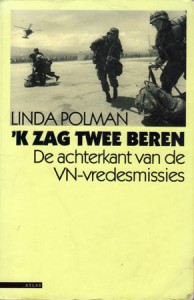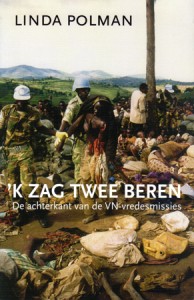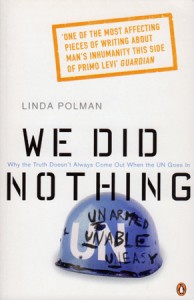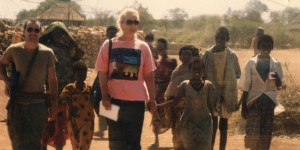‘One of the most affecting pieces of writing about man’s inhumanity this side of Primo Levi’
‘Excellently written, very sad and devastating, and would be important, if responsible people could read it and draw conclusions’
‘Onversneden journalistiek … Polman dook met de blauwhelmen onder in de moerassigheid van de ‘vredestheaters’ en deelde hun merkwaardig lot – als de Ernie Pyle van de gedemilitariseerde militair. In de beste zin van het woord schreef ze er ‘klassieke’ verhalen over: spannend, geestig, evocatief en altijd to the point (…) naar de waardevolste tradities van het ambacht’
‘Schitterend. Prachtig. Fascinerend. Dat je journalistiek zo ontroerend kunt laten zijn, daar heb ik grote bewondering voor. Het is hier en daar ontzettend komisch en toch doet dit boek je verbijsterd staan. Zoals de wereld in ‘k Zag twee beren beschreven wordt schrik je er toch weer van. En het feit dat je schrikt is het enige dat nog hoop geeft’
‘Absoluut top. Het beste boek over de Verenigde Naties dat ik ooit heb gelezen. Het verhaal is zo sterk, zo goed geschreven, groots en buitengewoon’
‘The curious wars-that aren’t wars that are United Nation peacekeeping operations have been waiting for their Joseph Heller. Linda Polman comes close. We Did Nothing is a tragedy written (mostly) as comedy, the Catch-22 of blue helmets. And it is true and fair. If a journalist’s role is to represent in a human and engaging way, the viewpoint of the voiceless, Polman has done an excellent and subtle job.
‘Hallucinerend en ontnuchterend’
What Michael Herr’s Dispatches was to war in the era of Vietnam, flower power and the Cold War, this is to the peacekeeping era in the Nineties. Graphic and sharp, laced with black irony and gonzo humour. The Haiti episode reads as if Tommy Cooper had scripted Graham Greene’s The Comedians. A brilliant book’
‘Horrifying, absurd, and, at times, killingly funny’
Een prachtig, indrukwekkend boek.’
‘A mix of Apocalyps Now and Evelyn Waugh’s Scoop. A harrowing and powerful read’
‘Extraordinary. One of the most chilling things we’ve read’
‘Linda Polman is a brilliant journalist. This is an immensely powerful book, written with great fluency, passion and elan. The vividness of her account has never been bettered’
‘Ik heb het ademloos gelezen en voelde mij na lezing nog machtelozer dan ik mij destijds als minister voelde.’
‘Linda Polman is oorlogsjournaliste van het zuiverste water. Een schitterend boek. Hilarische anecdotes wisselen zich af met gruwelijke sfeerbeelden. ‘’k Zag twee beren’ lijkt uitermate plezierig leesbaar, ware het niet dat de ondertoon zo beklemmend is’
‘Linda Polman is a writer in the mould of Kapusinski and Graham Greene. Her report on Haiti has become a classic’
‘This book recalls the reportage of Ryszard Kapuscinski and the black humour of Evelyn Waugh and Graham Greene’s fiction. The Rwandan section is among the most powerful pieces of journalism I have read’
‘Really loved it. Shocking, serious, thundering in a funny, savage way, and absolutely brilliantly written. Tom Wolfe, Joseph Heller – all the rave reviews are true!’
‘Polman stond erbij, keek ernaar en werd woest. De zeer persoonlijke verslagen lezen als een trein. Zeer indringend, vol machteloze woede geschreven’
‘For war correspondents, this important book is that diary you wished you had kept. For readers who live quiter, saner lives, the book is a salutary lesson in – and dark comedy about – impotence and failure. The book’s strengths are two: that Polman works from the field and knows her subject far better than the politicians and diplomats who are her raw material; and that she can see the tragicomedy in a diplomatic pretensions to which so many lives have to be sacrificed’
‘Linda Polman’s book is a passionate denunciation of the way the UN operates in crises. She was a courageous eyewitness. Unforgettably she describes the retaliatory massacre that took place at Kibeho. Her book is a small classic of man’s inhumanity to man’
‘Offers an unforgiving critique of failed, high-profile UN peacekeeping missions. The urge to weep -in frustration as well as sorrow- strikes frequently when reading this book’
‘Sommige passages passen zo in een roman van Naipaul. Schokkend. Het inferno beschreven en toch hier en daar oerkomisch’
Simply the most harrowing thing I have ever read. It reads like a vision of the Apocalyps. this is great journalism, make no mistake’
‘Combineer een vlotte pen met een dosis lef en een gevoel voor het absurde en je krijgt
‘’k Zag twee beren’. Dikwijls hilarisch. Een kostelijk en tegelijk dieptreurig boek’
‘A vivid, passionately written bouquet of reportage … The description … of a manic 24 hours with Zambian UN troops in a place called Kibeho in Rwanda is a nightmare scene from the theatre of the absurd to which peacekeeping so often belongs. Alternately funny and harrowing, it shows what can happen when the powers insist that a UN force be dispatched but refuse to provide it with the men, machines or mandate required to succeed’
‘Verbijsterend en ontluisterend’
‘An all too rare account, full of strong,well-observed and engaging reportage. The book’s piece de resistance is the story of the siege in Kibeho: an utterly appaling testimony of revenge killings. There is no denying the power of Polman’s narrative’
‘Een heel goed boek dat leest als een trein. Bikkelhard. Polman overbrugt de kloof tussen de vergaderzaal van de VN in New York en de Somalische woestijn. Ze beschrijft problemen waarover nog geen politicus heeft nagedacht’
‘Grandiose and very impressive’
‘Onthutsende conclusies. Dit boek kan door niet genoeg mensen gelezen worden’
‘Linda Polman’s book is a timely reminder of how the UN’s lofty, communal ideals so often founder on the rocks of national interest and big-power arrogance’
‘Extraordinary’
‘Opgeschreven in soldatentaal geeft het boek een rauw-realistisch beeld van de VN-fiasco’s. Een feest der herkenning voor VN-veteranen en een bij wijlen schokkend beeld van de VN-mammoetoperaties. ‘k Zag twee beren ademt de onwerkelijke atmosfeer van een dorre na-oorlogse beschaving, een eigentijdse variant van de Mad Max-films’
‘I was so moved that tears came to my eyes. Deeply impressing and a very intelligent and well written book’
‘A powerful indictment of the West’s ability to close its eyes to distant horrors
‘A book laced with Swiftian absurdity which at times may make the reader want to scream. Polman writes with forensic tenacity, relentlessly pursuing her lines of argument. Rwanda is a vision of hell which recalls another Khmer Rouge constructed, as described by John Pilger in Year Zero. Polman reports so well the result is a devastating expose of folly’
‘Dit boek is een aanklacht tegen de grootmachten die misbruik van de VN maken om zelf buiten schot te blijven’
‘Schrijnend’
‘Polman schreef het verhaal van de blauwhelmen zelf. Haar boek, dat leest als een trein, zorgt er misschien voor dat de volgende keer wanneer iemand zegt dat “de VN heeft gefaald”, we die uitspraak kunnen aanzien voor wat ze is: hol’
‘Required for diplomats, UN-delegates, politicians, think-tankers, aid-givers and anybody who thinks about these subjects. Polman writes with a passionate precision that would be rare for the sort of journalist who observe the worst and then goes home … Magnificent, heartrending. Some scenes from Rwanda are eerily reminiscent of death marches in Nazi-Germany’
‘Met oog voor kleine details weet Polman situaties kernachtig te beschrijven. Een gepassioneerd boek’
´Polman has been to every hell hole there is and she’s got a great story from all of them. You’ll marvel at the characters she uncovers’
‘Vlijmscherp, uitermate boeiend, soms ronduit hilarisch, indrukwekkend en ontroerend’
‘Compelling, at times horrifying, at times funny, always fascinating. In a relaxed yet finely crafted style Polman tells a story so far untold’
‘Ontnuchterend, maar geen zielig verhaal. Humor houdt de overhand’
‘A disturbing book. Polman is a courageous journalist with fortright opinions and a genuine, deeply felt concern for the ordinary people caught up in these cataclysmic events. This book will be of great interest to all those who are determined the tragedies so dramatically described in it are never forgotten and that all possible measures are taken to see that the international community will never let such shame be perpetrated again
‘Linda Polman werkt anders. Ze geldt als een buitenbeentje in kringen van journalisten die elkaar telkens op minder aangename plekken op deze aardkloot tegenkomen en die na een of twee weken de oorlog verslaan weer opkrassen’
‘Told with candour and clarity, it manages to capture the absurdly farcical nature of the UN’s role in today’s political geography’
‘Een zeer eigenzinnige journaliste’
‘’k Zag twee beren’ een heel cynisch boek kunnen zijn. Dat is het niet geworden door de vele hilarische beschrijvingen, Polmans oog voor details en rake typeringen en doordat ze betrokkenen hun eigen verhaal laat vertellen.’
‘Excellent. Clear and concise. As the world waits for the next UN Resolution, we keep in mind Polman’s words – they proved to be prophetic. More than anything, she has succeeded in putting a human face on the UN failure to end conflict and genocide in the last decade. After reading this book you won’t see the UN in the same way again
‘Haar leven is als de boeken die ze schrijft: avontuurlijk, mooi, spannend, griezelig en ontroerend’
‘Het schrikbarende lot van veel VN-vredesmissies in de jaren negentig is het best beschreven door Linda Polman in het boek ´k Zag twee beren. Het is een kroniek van soms heldhaftige VN´ers (zoals de Pakistanen in Somalië) in hopeloze situaties, met onuitvoerbare opdrachten. Het toppunt van de waanzin maakte zij mee in Rwanda, waar een jaar na de genocide van 1994, het leger van de slachtoffers (Tutsi´s) de burgers van de daders (Hutu´s) afslachtte in Kibeho onder het oog van Zambiaanse VN-soldaten en van Linda Polman. Ze beschrijft het koel en hartverscheurend: de onvermoeibare inzet van de mannen van kapitein Francis en hun onmacht iets aan het zich voltrekkende drama te doen, is de extreme variant van het probleem waarmee alle vredesmissies kampen. Voorlopig is het maar beter te zwijgen over nation building in Irak’
‘Linda Polman hat in ruandischen Flüchtlingslagern unglaubliche Dinge erlebt und sie in ergreifender Form aufgeschrieben’
Het boek werd ook besproken in Le Monde Diplomatique, Jakarta Post, Teheran Times en Morgunbladet (IJsland) en door Al Jazeera, Australian National Radio, Voice of America, BBC World en Radio New Zealand.
“‘k Zag twee beren” was geshortlist voor de Lettre Ulysses Award for the Art of Reportage (Berlijn, 2003) en voor de Freedom of Expression Award (Londen, Index on Censorship, 2004)






